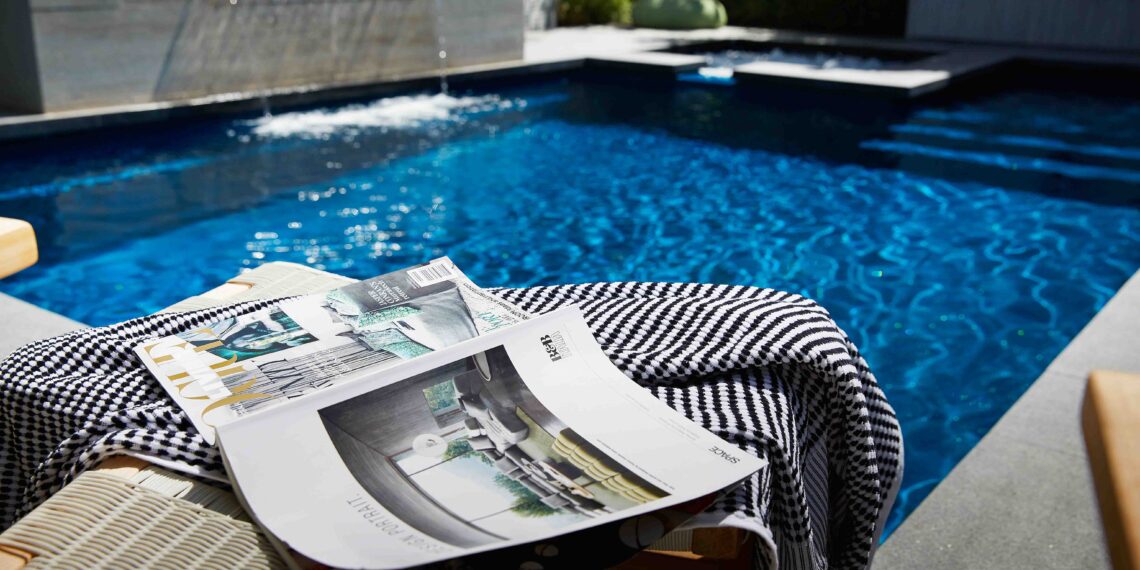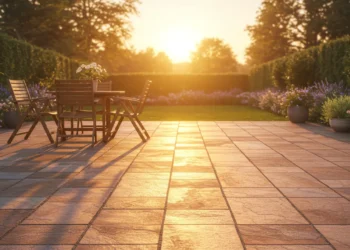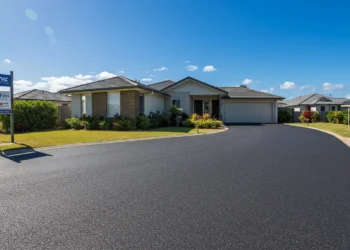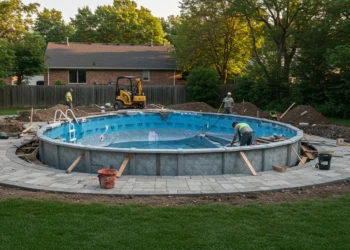Imagine basking in the sunshine as you float in the tranquil waters of your very own pool, with the sound of your family’s laughter cascading in the background. It’s a dream for many homeowners around the world, especially as the line between vacation and everyday living continues to blur.
With telecommuting on the rise and leisure time at a premium, home-based relaxation seems more appealing than ever. But before you cannonball into the bustling pool market, there are some considerable depth markers to check off. Building it is one of the most significant investments a homeowner can make, both in terms of money and property use, making the choices you face more than mere ripples in the water.
Assessing Your Space and Budget
Your Fibreglass Pools Melbourne pool plans must begin with an honest assessment of your space and finances. While your imagination might splash you in the direction of an Olympic-sized spectacle, the reality is often confined by the size of your backyard and the depth of your wallet. Assessing your space includes an evaluation of the following:
Available Space
Consider the dimensions of your yard. A pool could take up a significant portion of your outdoor area, so it’s essential to have a clear understanding of how much space you’re willing to dedicate to it. You need to account for safety zones, landscaping, and any future expansion plans.
Budget Planning
The cost of installing a pool can vary greatly, from a small above-ground unit that’s relatively inexpensive to a luxurious in-ground pool with a price tag that matches its grandeur. Your budget needs to account for more than just the installation cost, including maintenance, insurance, and increased utility bills.
Additional Costs
Don’t discount the additional costs that come with pool ownership, such as deck, fencing, lighting, and covers. These elements are crucial for safety, aesthetics, and the overall enjoyment of your pool, but they can also add up quickly.
Understanding Pool Types: In-ground vs. Above-ground
Once you’ve assessed your space and budget, it’s time to decide on the type of pool that’s right for your home. The two primary options are in-ground and above-ground, each with its own set of pros and cons.
In-ground Pools
In-ground pools are the most popular choice, offering a permanent addition to your property that can be customised to your liking. They are typically more durable and can increase the value of your home. However, they require significant yard space and can be more costly to install and maintain.
Above-ground Pools
Above-ground pools are a more affordable and often more flexible option. They require less space and offer the benefit of being moved or taken down if necessary. They are also quicker to install and typically require less maintenance. However, they have a shorter lifespan and are generally considered less attractive than in-ground options.
The Importance of Pool Features: Size, Shape, and Depth
The features of your pool can greatly impact your overall experience. This is where you get to personalise and make it uniquely suited to your lifestyle and preferences.
Size and Depth
The size and depth of your pool should be determined by how you plan to use it. If you have a large family or love to entertain, a bigger size may be necessary. If you’re looking for a space to relax and cool off, a smaller or a plunge pool may be more suitable. Remember, the deeper and larger it is, the more water it will require to fill and the more energy it will need to run.
Shape and Design
The shape and design can significantly impact the aesthetics of your backyard. From classic rectangular pools to freeform designs that mimic natural bodies of water, there are endless possibilities. Consider the overall style of your home and landscape to ensure a cohesive look that will stand the test of time.
Energy Efficiency and Maintenance: Long-term Costs and Savings
Pools can be notorious energy hogs, with the energy used for heating and filtering water representing a significant portion of a home’s utility costs. However, modern technology offers a range of solutions to make it more energy-efficient.
Pump and Filtration Systems
An energy-efficient pump and filtration system can dramatically reduce your pool’s operating costs. Look for systems with variable-speed technology that adapt to your needs, and consider using a cover to keep the water clean and reduce heat loss.
Heating Options
The type of heating system you choose can also affect your pool’s energy consumption. Solar heating is the most cost-effective and environmentally friendly option, but it requires a significant upfront investment. Gas and electric heaters are more affordable to install but can be more expensive to operate.
Maintenance
Regular maintenance is key to extending the life of your pool and keeping it safe and enjoyable. Invest in a good vacuum, skimmer, and brush to keep the water clean and stay on top of repairs to avoid larger issues down the line. Consider hiring a professional service for routine maintenance if you don’t have the time to do it yourself.
Choosing the Right Contractor
The success of your project hinges on the expertise and professionalism of the contractor you choose. Don’t be tempted to cut corners by hiring an inexperienced or unlicensed builder. Here are some tips for selecting the right contractor:
Research and References
Do your homework and research potential contractors thoroughly. Look for reviews and ask for references from past customers. Visit their previous job sites if possible to see the quality of their work firsthand.
Licences and Insurance
Make sure your contractor is properly licensed and insured. This protects you in case of accidents on the job and ensures that the work is up to code and professional standards.
Contracts and Payment Terms
Get everything in writing, including a detailed contract that outlines the scope of work, timeline, and payment terms. Be wary of contractors who ask for a large sum of money upfront before any work has been done.
Conclusion: Making an Informed Decision
Building a pool is a major decision that requires careful thought and consideration. By evaluating your space and budget, understanding the different pool types, prioritising the right features, and staying mindful of long-term costs and quality contractors, you’re setting yourself up for an enjoyable and worthwhile investment.
Your new pool can be the heart of your family’s summer fun and a relaxing oasis in the middle of your bustling life. Now is the time to start planning, preparing, and, ultimately, to take the plunge with these organisation steps and information in your pocket that will make all the difference. When it comes to selecting the right pool for your home, the adage rings true: Measure twice, cut once—or in this case, choose wisely once, enjoy for years to come.








